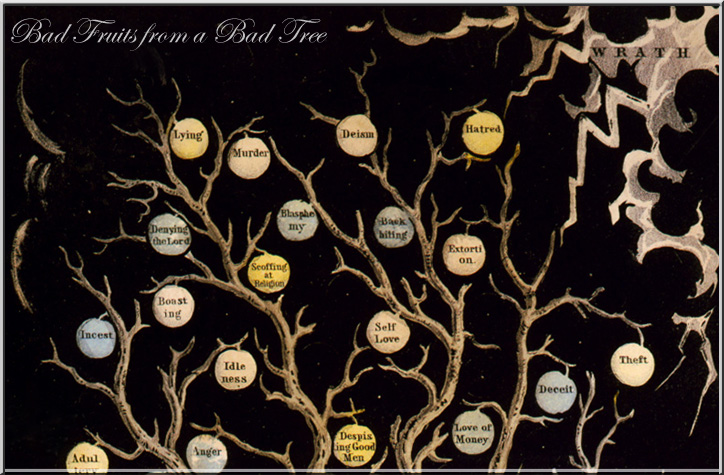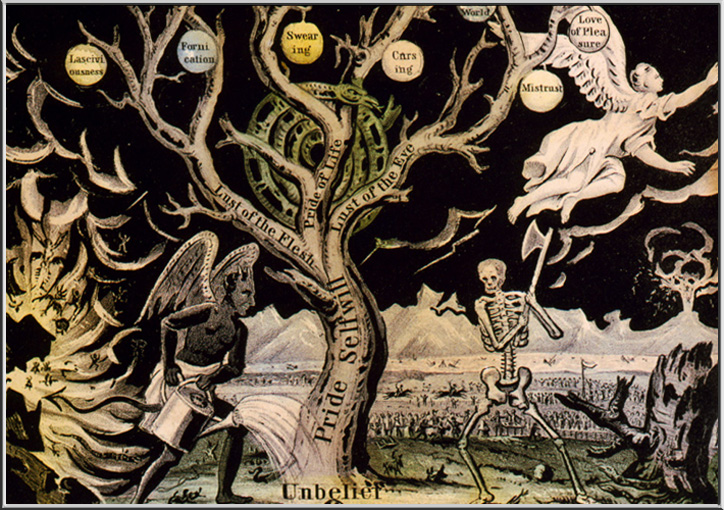
|
INSTRUCTION FOR THE SEVENTH SUNDAY AFTER PENTECOST by Leonard Goffine, 1871
A the Introit the Church invites us in the following words to give praise to God: Clap your hands all ye Gentiles: Shout unto God with the voice of joy. For the Lord is most high, He is terrible: He is a great King over all the earth. (Ps. xlvi.) Glory, &c. PRAYER OF THE CHURCH. O God, whose providence is never deceived in what it appointeth: we humbly beseech Thee to remove whatever may be prejudicial to us: and grant us whatever may be to the advantage of our souls. Through etc. EPISTLE. (Rom. vi. 19 - 23.) Brethren: I speak a human thing, because of the infirmity of your flesh: for as you have yielded your members to serve uncleanness and iniquity unto iniquity, so now yield your members to serve justice, unto sanctification. For when you were the servants of sin, you were free from justice. What fruit therefore had you then in those things of which you are now ashamed? For the end of them is death. But now being made free from sin, and become servants to God, you have your fruit unto sanctification, and the end life everlasting. For the wages of sin is death. But the grace of God, life everlasting in Christ Jesus our Lord. EXPLANATION. St. Paul here means to tell the Romans who had been converted to Christianity, but were still sensual and weak in the right, that they ought to be much more zealous in serving God and mastering their passions. Since they were still weak, he demands of them that they should at least strive now as hard to save their souls as they once did to destroy them. This certainly is but right, for many a man, if he would do as much for heaven, as he does for sin and hell, would become just and holy. But to know how wholesome it is to consecrate their members to justice and sanctity, he wishes them to consider what advantage they derived from sin. By sin is gained nothing but shame, confusion, sorrow, and death, but by a pious life God's grace and eternal life. -- Often consider this, my Christian, and do not defile yourself with sins, which profit nothing, but bring shame, grief, and the retributive wrath of God. GOSPEL. (Matt. vii. 15- 21.) At That Time: Jesus said to his disciples: Beware of false prophets, who come to you in the clothing of sheep, but inwardly they are ravening wolves. By their fruits you shall know them. Do men gather grapes of thorns, or figs of thistles? Even so every good tree bringeth forth good fruit, and the evil tree bringeth forth evil fruit. A good tree cannot bring forth evil fruit, neither can an evil tree bring forth good fruit. Every tree that bringeth not forth good fruit, shall be cut down, and shall be cast unto the fire. Wherefore by their fruits you shall know them. Not every one that saith, Lord, Lord, shall enter into the kingdom of heaven: but he that doth the will of my Father who is in heaven, he shall enter into the kingdom of heaven. Who are the false prophets? Those seducers who by an appearance of virtue and honesty lure innocent simple souls in numerous ways from the right path, and lead them to vice and shame; who by sweet words, such as: "God is full of love, and will not be so severe on sin, He does not require so very much of us, He knows we are weak, and if a person sins, he can be converted," seek to steal away the fear of God, delicacy, and modesty from harmless souls, and then ruin them. Guard against such hypocrites, for they have the poison of vipers on their tongnes. By the false prophets are also meant the false teachers and propagators of error who by superficial words degrade the true faith, who speak always of love and liberty, and who under the pretence of making people free and happy, bring many a soul to doubt and error, depriving them of true faith and peace of heart. Lend no ear to them, do not read their books and writings, but carry them to your pastor, and try to induce others to do the same. How can we know the false prophets? We may know the deceivers by their works, for evil, corrupted men can produce only bad fruit. If we look into their life and inquire about it, we shall find, that at heart they are immoral hypocrites who observe external propriety only that they may the more easily spread their poison. The false teachers and messengers of error may be known partly from their lives, but especially by their intentions, which are to subvert all divine order, and to put the unrestrained lust of the flesh and tyranny in its place. Who else are understood by the false prophets? Those who under pretence of making men happy and rich, induce the credulous to make use of superstition, of wicked arts, deceit, and injustice; and especially those who under the deceiving appearance of liberty and equality, independence, and public good, incite them to things which lead to open or secret revolt against civil and ecclesiastical authority. Be not deceived by these so called public benefactors, who look always to their own advantage, but do you trust in God, support yourself honestly, live like a Christian, and you will find true liberty and happiness here and there. |

|
Why does Christ say: Every tree that bringeth not forth good fruit, shall be cut down and shall be cast into the fire? He shows by this, that to have done nothing good, is enough for damnation; and He adds, therefore, Not every one that saith: Lord, Lord (who outwardly professes himself my servant, but is not really such), shall enter into the kingdom of heaven, but he who, by the fulfilment of the duties of his state of life and by the practice of good works, does the will of my Father, merits heaven. Strive then, my Christian, to fulfil God's will in all things, and to perform your daily duties with a good intention, and you will certainly obtain the kingdom of heaven. INSTRUCTION ON GOOD WORKS What is a good work? A good work is anything which according to God's will is in itself good, and is performed with the proper intention, in a state of grace, and for love of God. What are the principal good works? Prayer, fasting, and almsdeeds. These are especially inculcated in holy Scripture. (Tob. xiii. 8.) By prayer is here understood all religious services, by fasting all mortification of body and soul, by almsdeeds all works of charity. How many kinds of charitable works are there? Two kinds, the corporal and spiritual. What are the spiritual works of mercy? Those that are performed for the good of the soul, as: to punish sinners, to teach the ignorant, to advise the doubtful, to console the afflicted, to patiently suffer injustice, to willingly forgive those who have injured us, to pray for the living and the dead. What are the corporal works? Those which are performed for the good of the body, as: to feed the hungry, to give drink to the thirsty, to clothe the naked, to harbor strangers, to liberate captives, to visit the sick, and to bury the dead. Can we be saved without good works? No, for Christ expressly says: Every tree that bringeth forth not good fruit, shall be cut down and shall be cast into the fire. And the servant in the gospel who did not even waste the talent received, but only hid it in the ground, was cast, for that alone, into outer darkness. Therefore those are very wrong who hope to go to heaven simply, because they do nothing bad. This error St. Chrysostom meets plainly, when he says: "If you had a servant who was, it is true, no robber, no glutton or drunkard, but who sat at home idle, neglecting every thing for which you had employed him, would you not pay him with the whip and send him off? Is it not bad enough not to do that which duty demands?" A Christian is bad enough who though he does no wrong, does no good, and he loses the reward; for heaven is the reward of work performed, and if no work has been done, no reward is to be expected. SUPPLICATION Guard me from false prophets, O Lord, and from heretics, and seducers, and grant me the grace, that according to St. Paul's instructions I may become fruitful in all good works. Inflame my heart, that I may adorn my faith with them, thus do the will of the Heavenly Father, and render myself worthy of heaven. http://catholicharboroffaithandmorals.com/ |